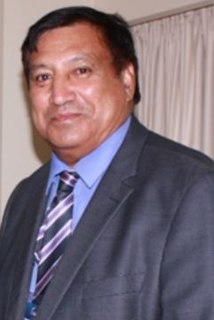
The politics of the Cook Islands, an associated state, takes place in a framework of a parliamentary representative democracy within a constitutional monarchy. The Queen of New Zealand, represented in the Cook Islands by the Queen's Representative, is the Head of State; the prime minister is the head of government and of a multi-party system. The Islands are self-governing in free association with New Zealand and are fully responsible for internal affairs. New Zealand retains some responsibility for external affairs, in consultation with the Cook Islands. In recent years, the Cook Islands have taken on more of its own external affairs; as of 2005, it has diplomatic relations in its own name with eighteen other countries. Executive power is exercised by the government, while legislative power is vested in both the government and the islands' parliament. The judiciary is independent of the executive and the legislatures.
The Cook Islands First Party was a political party in the Cook Islands. The party was originally a faction within the Cook Islands Democratic Party which supported Prime Minister Robert Woonton over Terepai Maoate. The 2004 elections saw the Democrats win a clear majority, but it was not clear whether Woonton would have the numbers within the party to remain Prime Minister. Woonton's announcement on 15 November 2004 that he was forming a coalition with the rival Cook Islands Party with himself as Prime Minister. This touched off a bitter struggle within the Democrats, which ultimately saw Woonton and his Health Minister Peri Vaevae Pare expelled from the party. Woonton responded by launching his own party, the Demo Tumu Party, on 1 December 2004.

General elections were held in the Cook Islands on 7 September 2004. Initial results showed the Democratic Party winning by a wide margin, but close results led to 11 electoral petitions being filed, delaying the date Parliament could sit until mid-December. In the interim, Prime Minister Robert Woonton announced that he was forming a coalition government with the rival Cook Islands Party. This led to a split within the Democrats, with Woonton and four other MPs leaving to form the Demo Tumu Party. With 14 MPs, the coalition had a comfortable majority in Parliament.

General elections were held in the Cook Islands on 16 June 1999 to elect 25 MPs to the Parliament. The Cook Islands Party won 11 seats, the Democratic Alliance Party 10 seats, and the New Alliance Party 4 seats.
Norman George is a Cook Islands politician and former Speaker of the Cook Islands Parliament, Deputy Prime Minister, and Cabinet Minister.
Wilkie Olaf Patua Rasmussen is a Cook Islands politician and former Cabinet Minister. He is leader of the Cook Islands Democratic Party, and represents the constituency of Penrhyn.
Ngamau Mere Munokoa OBE, also known as "Aunty Mau", was a Cook Islands politician and former Cabinet Minister. She was the third woman elected to the Cook Islands Parliament and the first to hold the post of Cook Islands Deputy Prime Minister. She is a member of the Cook Islands Democratic Party.
Kete Ioane was a Cook Islands politician. He was a Cook Islands Democratic Party Member of Parliament from 1999 to 2010 and served as a cabinet minister between 2006 and 2009.

The 12th Cook Islands Parliament was a term of the Parliament of the Cook Islands. Its composition was determined by the 2006 elections, held on September 27, 2006. It was dissolved for the 2010 election on 24 September 2010.

Sir Tom John Marsters, is the 7th Queen's Representative to the Cook Islands. He is a former Deputy Leader of the Cook Islands Party and Deputy Prime Minister of the Cook Islands.

Henry Tuakeu Puna is the Prime Minister of the Cook Islands. He is leader of the Cook Islands Party and has been Prime Minister since November 2010.
Tupou Alfred Faireka is a former deputy leader of the Cook Islands Party. He was an MP for 13 years and served as a Cabinet Minister.
The 2005 Manihiki by-election was a by-election in the Cook Islands electorate of Manihiki. It was held on 8 February 2005, shortly after the 2004 general election, and was precipitated by an electoral petition finding the result in the seat to be a dead tie. Both parties to the petition, Prime Minister Robert Woonton and Cook Islands Party leader Henry Puna had agreed that in the event of a draw the question should be decided by the voters, and so Woonton resigned. As a result, Jim Marurai became Prime Minister.

The 13th Cook Islands Parliament is the previous term of the Parliament of the Cook Islands. Its composition was determined by the 2010 elections on 17 November 2010.

A general election was held in the Cook Islands on 9 July 2014. It determined the membership of the 14th Cook Islands Parliament.

General elections were held in the Cook Islands on 14 June 2018 to elect the 24 members of the 15th Cook Islands Parliament.






